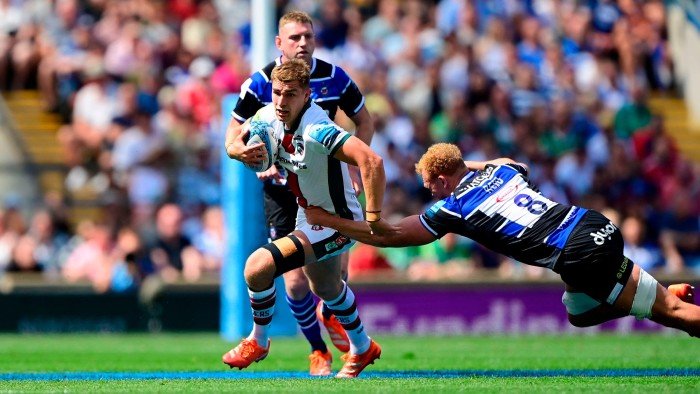Private equity-backed Premiership Rugby has “turned a big corner” after a financial crisis caused the collapse of three clubs, and is now focused on attracting international investment, according to its chief executive.
The Premiership, English rugby union’s top professional league, started the 2022-23 season with 13 clubs but ended it with 10 as Wasps, Worcester Warriors and London Irish all fell into bankruptcy. Newcastle Falcons has been saved from a similar fate by a pending takeover by Austrian energy drinks brand Red Bull.
A report by accountancy firm Leonard Curtis last year warned that high debts and persistent losses had left seven of the remaining clubs “balance sheet insolvent” and totally reliant on funding from owners.
But Simon Massie-Taylor, chief executive of Premiership Rugby, which runs the league, said the game was “on a different trajectory” thanks to growing audiences, changes in governance, increased commercial income and long-term partnerships with broadcaster TNT Sports and national governing body Rugby Football Union.
“We’re just in a very, very different place now. We’ve done a load of work stabilising things,” he told the Financial Times. “That’s not to say there won’t be challenges in the future, but I think we’ve turned a big corner.”

Massie-Taylor, who was appointed chief executive in 2021, said the game had made progress “chipping away” at its problems and that the next set of club accounts would show falling debt and financial contributions from owners.
“It’s a bit like the economy, there’s no quick fix here,” he said.
Private equity firm CVC, a previous owner of Formula 1, paid £200mn for a 27 per cent stake in Premier Rugby in 2018 as part of a broader play on professional rugby union and sport more widely.
It also has stakes in Six Nations Rugby — the annual northern hemisphere international series — and the United Rugby Championship, which features clubs from Ireland, Italy, Scotland, South Africa and Wales.
But when Covid-19 hit and live sport was put on hold, Premiership teams used funds injected by CVC to survive instead of investing in infrastructure and growth. Their debts also grew after the UK’s Department for Culture, Media and Sport lent about £124mn to Premiership teams during the pandemic.
As part of the recovery plan, Premiership Rugby and TNT Sports have targeted Premier League football fans by screening games immediately after football matches. They have also introduced initiatives such as fixtures centred on derby grudge games to increase viewership.
Almost 82,000 spectators watched Bath beat Leicester Tigers in the Premiership final at the Allianz stadium in Twickenham last weekend, the second year in a row the game has sold out. It had an average audience of 973,000 on TNT Sports and ITV1 — a record for a fixture in the competition.
Rob Wilson, professor at University Campus of Football Business, which offers sports-focused degrees, said owners appeared to be more disciplined on spending and were having some success in boosting interest from local fans and sponsors.
“I would expect to see some signs of improvement in club finances — call it green shoots of recovery,” said Wilson, who co-wrote the Leonard Curtis report.
Although appetite for live rugby remains strong and the financial situation has stabilised, Massie-Taylor said the structure and ownership model of the sport still needed to be overhauled.
Premiership Rugby has tapped investment bank Raine Group and Deloitte to carry out a review of the game and come up with recommendations for attracting global investors at club, and potentially league, level.
The moves to reshape professional rugby union in England also come as it faces a challenge from a proposed new international club competition — dubbed R360 — fronted by former England captain Mike Tindall.
Set to launch next year, R360 aims to be a franchise-based competition, luring the best players with bumper contracts to play games at venues across the world, and shown on free-to-air platforms.
But Massie-Taylor has dismissed the project as a “distraction”, while Andrew Georgiou, who oversees TNT Sports in the UK and Ireland, recently described it as “commercially unsustainable” and “delusional”.

“The big project now around the Premiership is to ensure that there is an accelerated growth story and that this is as investable a product as possible for future investors,” said Massie-Taylor.
Professional rugby had become too reliant on a handful of wealthy English owners to fund their clubs, he added. “That will change, and that will need to change, in terms of appealing to a global market.”
The most likely outcome is for the Premiership — which is to be renamed the Gallagher Prem — to move to a franchise model, similar to those in US sports and in the short-form English cricket competition The Hundred. The auction of team franchises earlier this year for The Hundred, which raised more than £500mn, has greatly informed decision making within rugby.
A franchise model would eliminate the financial risks associated with promotion and relegation, although no team has moved between the Premiership and Championship since 2022. The winners of the second-tier competition this year, the Ealing Trailfinders, were not promoted after failing to meet minimum standards, such as stadium size.
